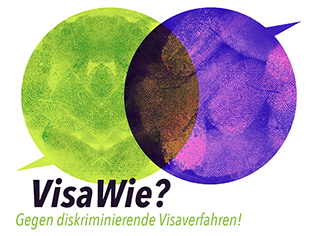Passport Quartet
With the help of a crowdfunding campaign the party game “Passport Quartet” can go into production. Click here for the campaign.
visaexperiences.org
The idea behind this platform is, that people from all over the world can publish and share their experiences with European embassies related to the process of conceding visa. On the one hand exchange may take place through published reports of experiences, on the other hand the discrimination becomes generally known and we can exert public pressure.
The accounts may differ a lot from each other as everyone is free to share the experiences she/he wants to, and as many details as desired. We publish the reports of experiences in each case written in original language as well as in a German translation. No editorial interventions take place.
You are welcome to tell your story in an audio-visual realization. If desired by the involved people, their names are remained anonymous.
“The power of passport: a film by the campaign VisaWie?”
Begin of shooting was in November 2014. The final version went online on 18th May, 2015 in various social networks. As locations of shooting served some places in Germany (Karlsruhe, Dortmund, Frankfurt Airport) as well as in Bénin. Since then the team of producers presented the short film in various places in order to point out the difficulties of the process of conceding visa. Moreover, the film has been broadcasted by three German TV stations so far.
An announcement on 21st November, 2015 revealed that the film finished 3rd on “Publikumspreis der Landesanstalt für Medien NRW” (Audience Award of Regional Institute of Media North Rhine-Westphalia) which was determined through an online voting.
The film of the campaign exists since summer 2015 in OV with Spanish, French and English subtitles, too. It can be used for educational activities as well as be presented in cinemas with prior agreement.
Educational Work
In order to cause long-lasting changes in the perception of global injustices, it is inevitable to sensitize people by corresponding educational work, especially concerning visa procurement and freedom of movement. For this purpose we are methodically working out the topic in order to offer a comprehensive pedagogical education concepts and material. These materials are available on request.
In addition, we are represented at various events with our workshops, such as the international week against racism, preparation and evaluation seminars by volunteers or project days at schools, to name a few.
For requests for educational events on visa policy and visa procedures please contact info (at) visawie.org.
political work at the EU
An important part of our work consists of keeping ourselves updated about legislative procedures concerning visa policies. This is why we also have to direct our work towards politicians, to seek exchange with them and to critically accompany the legislative process. At the moment, this is mainly happening at the EU level.
Only recently, the negotiations on the directive 2013/0081COD have been terminated – unfortunately with disappointing results from our perspective. Why we perceive the negotiated results as disappointing, we explain here in German language. While the directive was being negotiated, we addressed parliamentarians with an open letter and asked them to campaign against a discriminating visa process.
At the moment, the visa codex is being negotiated at the EU. Also here, we interfere and inform the public about the negotiated contents. In a letter, we prompted parliamentarians to promote an open Europe in the negotiations.
Databases and statistics
One important aspect of our work is the collection, organization and evaluation of data in order to verify our statements and explain the background of our claims. There is, for instance, available data on how many and from which countries visa applications are submitted to Germany and how many of them are declined. These numbers suggest a structural, racist and institutionalized visa issuance method.
For German speakers the Migazin and the Federal Agency for Civic Education already offer important information and statistics.
During discussions on visa policy and issuance we are confronted with the same prejudices again and again. We want to collect those prejudices and prove them wrong with facts and arguments.
